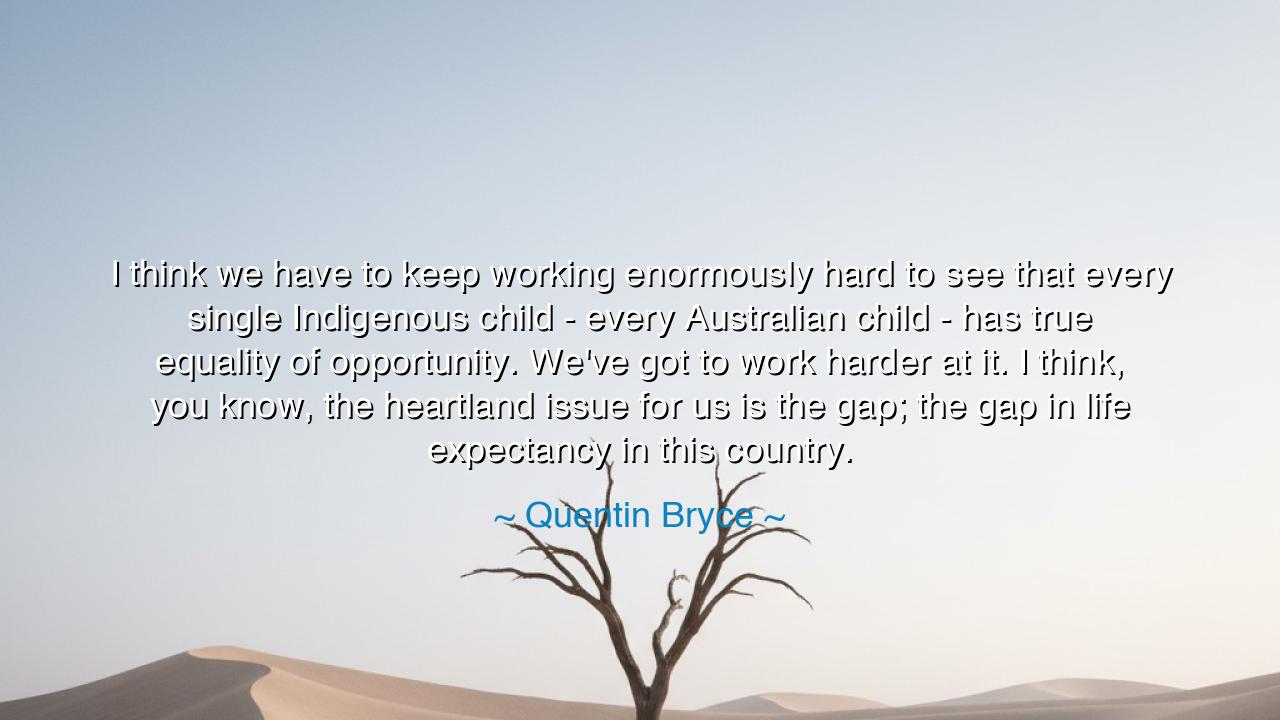
I think we have to keep working enormously hard to see that every
I think we have to keep working enormously hard to see that every single Indigenous child - every Australian child - has true equality of opportunity. We've got to work harder at it. I think, you know, the heartland issue for us is the gap; the gap in life expectancy in this country.






When Quentin Bryce, Australia’s first female Governor-General, declared, “I think we have to keep working enormously hard to see that every single Indigenous child—every Australian child—has true equality of opportunity. We've got to work harder at it. I think, you know, the heartland issue for us is the gap; the gap in life expectancy in this country,” she was not simply making a political statement. She was issuing a moral summons, a cry from the conscience of a nation still wrestling with its own soul. Her words speak not only to Australians but to all peoples who inherit the weight of history — the duty to heal, to lift, and to restore dignity where injustice has left its scars.
From the beginning, the story of Australia’s Indigenous peoples has been one of profound endurance. For tens of thousands of years, they lived in harmony with the land, their traditions older than empires, their wisdom deep as the earth itself. Yet when colonization came, it brought with it dispossession, disease, and despair. Generations of Indigenous children were torn from their families, their languages silenced, their futures fractured. What Bryce called “the gap” — the disparity in life expectancy, education, and health between Indigenous and non-Indigenous Australians — is not merely a statistical measure. It is the living wound of history, still open, still aching for justice.
When Bryce speaks of equality of opportunity, she does not mean the illusion of equality that lives only in lawbooks and speeches. She means the real equality — the chance for a child in Arnhem Land or the outback to dream, to study, to live, and to thrive as freely as a child in the cities of Sydney or Melbourne. To her, equality of opportunity is not a gift bestowed by privilege; it is a birthright. Yet that birthright has been denied to too many for too long. Her plea — “we’ve got to work harder at it” — is both gentle and fierce, the voice of a leader who knows that compassion without effort is hollow.
History shows that the struggle to bridge such gaps is never easy, but it is always sacred. Think of Nelson Mandela, who, after twenty-seven years in prison, emerged not with vengeance but with vision. He worked tirelessly to close the vast divides of South Africa — not only between races, but between the privileged and the forgotten. Like Bryce, Mandela knew that justice begins with opportunity — that freedom is meaningless if some are left behind. His mission was not to erase difference, but to ensure that difference no longer dictated destiny. So too must Australia, and indeed every nation, continue this labor of love — to make equality not a word spoken, but a truth lived.
Bryce’s words remind us that the measure of a civilization is not in its monuments or wealth, but in how it treats its most vulnerable. When a nation closes its eyes to the suffering of its own children — Indigenous or otherwise — it diminishes itself. But when it opens its heart and hands, when it builds schools where there was silence, hospitals where there was neglect, and hope where there was none, it redeems its spirit. The “gap” Bryce speaks of is not only in life expectancy; it is in empathy, in understanding, in will. And this gap, too, must be closed.
Let this truth be passed to the generations: equality is not achieved by good intentions, but by unceasing labor. To lift one child is to lift the future. To give one community clean water, one school, one chance, is to restore a fragment of the divine balance. We must work, as Bryce says, “enormously hard” — harder than comfort allows, harder than politics demands. For only through perseverance, humility, and unity can the wrongs of centuries be transformed into the wisdom of tomorrow.
And so, the lesson stands: every child, no matter where they are born, carries within them the light of possibility. Our duty is to clear the path before that light, to ensure that the accident of birth never determines the destiny of a soul. Let us, then, be the builders of bridges where once there were barriers, and the healers of wounds that time alone cannot mend. For when all children stand equal before the dawn, the nation itself will stand reborn — not divided by its past, but redeemed by its compassion.






AAdministratorAdministrator
Welcome, honored guests. Please leave a comment, we will respond soon